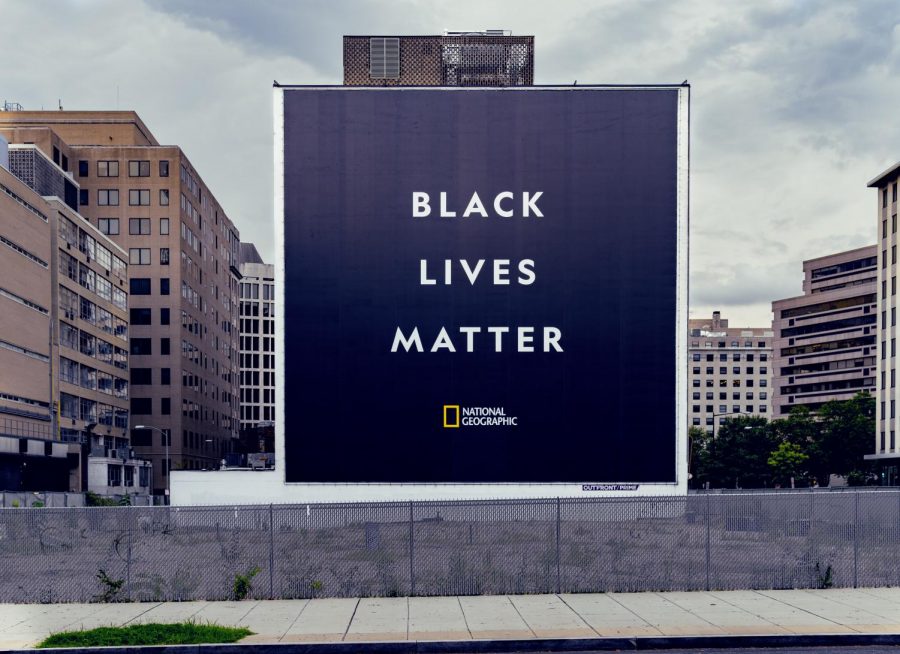“Arrest the cops”: Exploring the parallels between performative activism and profits
Companies and celebrities are profiting off tragedies
Photo by Ted Eytan | Licensed under CC BY-SA 2.0
A “Black Lives Matter” poster by National Geographic stands in Washington D.C.
November 7, 2020
The tragedies of 2020 — like ones pertaining to racially-motivated police brutality — have heightened longtime discussion on racial injustice. Carried by the tides of news media and social media coverage, Breonna Taylor and George Floyd became household names, and the link between race relations and police brutality is now at the center of national discussion. According to the Pew Research Center, just last month, over 81% of social media users reported friends or family members speaking up against racism through social media.
Many companies have also joined this discussion of racial inequality. While some brands have used their influence to increase awareness, the rapid commoditization by others — in the name of profits — threatens to thwart progress and meaningful discussion. Influential figures like Breonna Taylor are being reduced to magazine covers, merchandise and memes, ultimately belittling the movement and trivializing its nuances.
One culprit of this is Vanity Fair’s September issue. Its cover is decorated with a painting of Breonna Taylor, clad in a soft teal dress, with her hair loosely arranged into neat congruous swirls. The painting’s pastel colors exude a mellow and easily palatable tone, especially for White consumers. This is unsurprising, considering the glamorous lifestyles and high fashion synonymous with Vanity Fair’s target audience.
However, there is no denying the overwhelmingly positive intentions of the issue. Guest-edited by journalist and author Ta-Nehisi Coates, it offers a powerful and revealing account of the Black experience in this country. But the cover itself reduces Taylor’s personhood into a seemingly idyllic image designed to attract sales and subscriptions. No longer is her story — or the complex conundrum at hand — relevant. Rather, Taylor’s legacy is exploited to evoke sympathy in readers, influencing them to believe that purchasing or sharing the magazine will help the fight. The painting does not do justice to Breonna Taylor’s legacy or address the important questions in her aftermath; it simplifies that discussion into a temporary fad.
Indeed, the phrase “Arrest the cops who killed Breonna Taylor!” has become an almost obligatory social media chant. Many celebrities now use it to show support for Breonna Taylor while capitalizing on her followers. Some are even blatantly unapologetic in doing so — for example, actor Lili Reinhart posted a photo of herself nearly nude on a beach, proclaiming that with that photo, she had “gotten [her audience’s] attention,” and it was time for her audience to “demand justice” for Breonna Taylor.
While that behavior may not be common across the board, those motives are. The national cries for justice and equality hold the potential for immense change, but its buzzwords and images are also a hotbed for clever marketing. And when those phrases and images are circulated so frequently and uncritically by corporations and celebrities seeking not justice but attention, they inevitably lose their meaning.
In some ways, these efforts are working. According to an Ace Metrix study, a recent McDonald’s advertisement that mentioned George Floyd was seen as empowering by 57% of viewers. But some saw it as exploitative — both the McDonald’s advertisement, and a recent one from the consumer goods company Procter & Gamble, earned greater “exploit” scores than empower scores. In addition, 41% of Black Americans said they don’t believe these brands actually understand their experiences, as opposed to only 34% of the general population.
Using Blackness in advertisements is not a new trend. In the past, brands like Mrs. Butterworth and Aunt Jemima relied heavily on caricatures to attract attention. Pivoting to Black Lives Matter creates a facade that their stances are evolving, but the fundamental consequence — reducing complex issues into palatable images for consumption — does not do these issues justice. Companies have the responsibility of using these images ethically, especially given the popularity of the movement and the influential nature of their advertisements.
This lesson extends beyond the corporate world. Posting content in support of a movement can be helpful, but we must be wary of our motives and their consequences. Blindly — and sometimes harmfully — parroting content to sympathize with certain groups in hopes of gaining their support, without actually taking the time to understand their plight and what they are fighting for, is not only performative allyship, but actively opposes the goals of that movement. In a digital sphere saturated by these posts, it is crucial that we not just monitor, but call out and subvert these trends as they occur. When posting about Breonna Taylor, consider linking petitions or places to donate; when creating artwork or profiting in some way off of her, consider donating earnings to the NAACP or similar organizations.
Many of these insidious patterns pass us as harmless advertisements. We must keep a critical eye on the advertisements and posts that inundate our digital feeds. The racist and insensitive posts we normally spot may not always be obvious; seemingly normal content can just as badly perpetuate harmful stereotypes, even if paradoxically, the movement that the message purports to support opposes those stereotypes. It is critical that we address, educate and fight against the injustices that cause tragedies — not capitalize off of them.



















